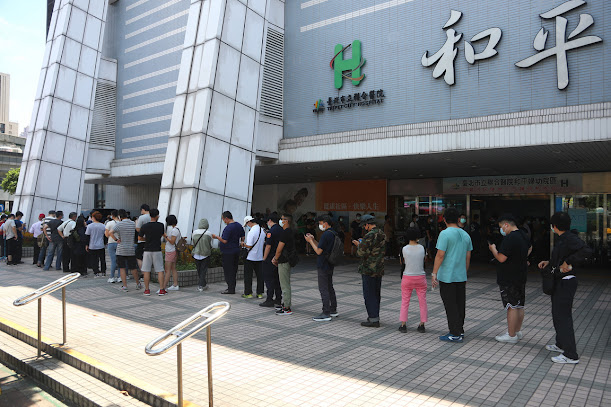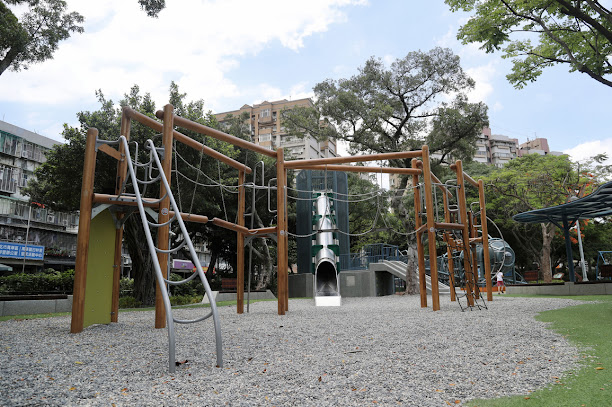Vaccine R&D, test kits vs Covid-19
News that matter in Papua New Guinea
People wait in a line outside Taipei City Hospital’s Heping branch to be vaccinated against Covid-19. - CNA photo
Vaccine R&D, test kits vs Covid-19
PORT MORESBY: In Part 2A of our series on Taiwan’s experience in fighting the Coronavirus (Covid-19) pandemic, we look further into how the Government enhanced public-private partnerships to contain Covid-19, focusing on Research & Development.
The earlier reports were these: https://pngcybermonitor.blogspot.com/2021/07/fighting-covid-19-taiwans-successful.html (Fighting Covid-19: Taiwan’s ‘successful’ experience)
https://pngcybermonitor.blogspot.com/2021/07/use-of-big-data-ai-to-curb-covid-19.html (Use of big data, AI to curb Covid-19)
https://pngcybermonitor.blogspot.com/2021/08/taiwans-ict-support-in-covid-19-battle.html (Taiwan’s ICT support in Covid-19 battle)
This is part 2B:
Actively conducting R&D on synthesis of potential treatment drugs, vaccines, and test kits:
Remdesivir has been approved for use by the US and other countries. Following 14 days of research, in February 2020, Academia Sinica completed the synthesis of remdesivir at the 100mg level with a 97 per cent level of purity.
The National Health Research Institutes (NHRI), the most prominent medical research centre in Taiwan, has synthesised remdesivir at the gram level. In emergency scenarios, these drugs can be produced domestically through government mandates.
The NHRI also identified in early April 2020 a protease inhibitor of Covid-19, 10 times stronger than current inhibitors.The Development Center of Biotechnology announced in early March 2020, that it had completed lab synthesis of the second-line anti-influenza drug favipiravir, which several countries have approved as a pneumonia treatment.
In future, the government will work with domestic pharmaceutical companies to provide sufficient amounts of antiviral drugs for Covid-19 patients. Taiwan’s goal in conducting this R&D and synthesising potential drugs is to ensure self-sufficiency in the event of a supply shortage from foreign sources and, if possible, to provide such drugs to other countries.
Vaccine R&D:
Taiwan’s Medigen Vaccine Biologics Corp signed an agreement with the US National Institutes of Health in mid-February 2020, for the joint development of a Covid-19 vaccine, which received approval to begin the second phase of clinical trials in December 2020.
In late January 2021, the CECC announced conditional approval for United Biomedical Inc to commence the second phase of clinical trials of its vaccine, making it the second Taiwanese developer to receive such permission.
In addition to investing in vaccine R&D, the Development Center of Biotechnology has also used its database of antibody genes to develop antibody drugs for Covid-19 treatment.
Protected board game fun … A group of elderly people wearing face masks play Xiangqi, known elsewhere as Chinese chess, at Bangka Park in Wanhua District, Taipei. The old area of Taipei has in recent days seen a surge in the number of new domestic Covid-19 cases. - CNA photo.
Test kits:
In early March 2020, a research team at Academia Sinica announced that it had successfully developed a key reagent for rapid test kits that can show within 15 to 20 minutes whether a person is infected with Covid-19. Trials began in April to optimise mass production, and nine companies have obtained technology transfer rights from Academia Sinica.
The Taiwan Food and Drug Administration approved the reagent in August 2020. Meanwhile, the Institute of Medical Device and Imaging of National Taiwan University’s College of Medicine developed a rapid screening device to enhance epidemic control efforts in late March.
This handheld, noninvasive device is able to detect within 30 seconds whether a person has pulmonary infiltrates or edema.
The National Health Research Institutes developed a new generation of infrared thermal imaging cameras in April that boast four key functions: immediate detection of human face contours through AI; simultaneous temperature readings for large numbers of people who are standing in close proximity to one another; immediate notifications of temperature alerts; and identification document sensors.
With advanced functionality and competitive prices, these cameras are poised to become another important tool in the fight against Covid-19.
The Government coordinated with taxi and rental car companies to roll out convenient services for passengers requiring transportation from airport to home quarantine location:
To minimise risks associated with arriving travelers who have been ordered to undergo home quarantine and have to get from the airport to their home or other quarantine locations, the Government came up with a special programme to arrange transportation services for these people, offering point-to-point services with the help of taxi and rental car companies.
This programme has not only reduced taxi waiting times at airports but also eliminated an avenue through which the virus could possibly spread. Epidemic monitoring management has thus been strengthened.
Public-private partnerships to ensure that students can continue to learn even if schools are closed:
To assist schools at the senior high school level and below with ensuring a high quality of learning and adopting online schooling mechanisms, the Education Ministry released reference guidelines for online classes and learning so that special municipality, city, and county governments and the schools they supervise can make appropriate preparations.
The Government is managing and allocating IT resources, purchasing mobile equipment and 4G cards, and coordinating with the five major telecom operators in Taiwan to provide disadvantaged families with free internet accounts in the event of school closures and other families with preferential rates.
Through public-private partnerships, resources and services required for online classes are being delivered. With the support of private enterprises, video conferencing solutions from Microsoft Teams and Cisco WebEx and software from textbook publishers were made available free of charge to teachers and students nationwide.
Nearly deserted … Only one child is seen at the playground in Taipei's Youth Park, a day after the Covid-19 alert for the city and New Taipei was raised to level 3 to restrict gatherings and unnecessary travel until May 28. - CNA photo.
Close cooperation between the central government and local authorities to contain the pandemic - Special epidemic prevention hotels were designated nationwide to minimise the risk of transmission:
Since March 19, 2020, all passengers arriving in Taiwan have been required to undergo a 14-day period of home quarantine. To further consolidate barriers to disease transmission and prevent situations in which people are refused accommodation because of pandemic fears and subsequently have to search far and wide for a place to stay, the Taipei City government in mid-February approached licensed hotel operators willing to cooperate in establishing an epidemic control hotel network.
As of January 2021, about 16,000 rooms had been made available in such hotels nationwide.
Providing care to the pets of confirmed Covid-19 patients and protecting the health and welfare of animals:
To protect the welfare of animals and reduce concern among residents, local governments developed programmes to care for the pets of people diagnosed with Covid-19 based on suggestions provided by the Bureau of Animal and Plant Health Inspection and Quarantine of the Council of Agriculture.
As part of these programmes, local governments worked with animal hospitals to quarantine and care for animals, dispatch personnel to visit the homes of patients together with policemen and borough chiefs to feed animals, and transport them to designated shelters for quarantine, so as to jointly protect the health of both humans and animals.






Comments
Post a Comment